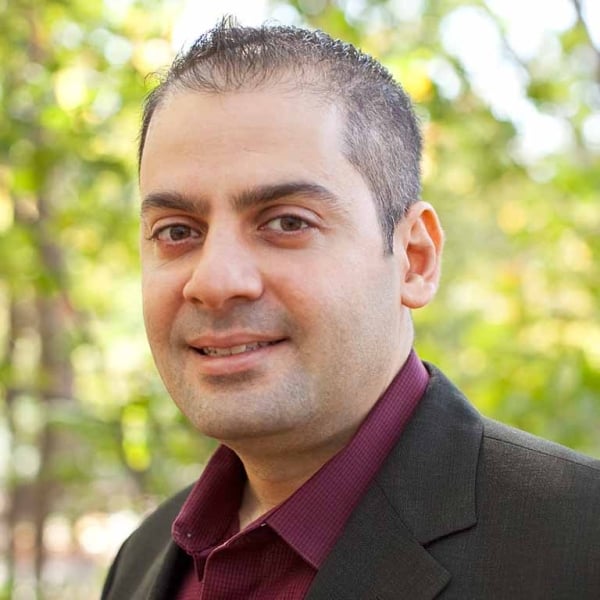You have /5 articles left.
Sign up for a free account or log in.

Indiana University
Some faculty members at the Indiana University at Bloomington say administrators ignored the university’s own shared governance policies when they temporarily barred a tenured professor from teaching after he helped book a room on campus for a November event hosted by the Palestine Solidarity Committee, a student organization.
“We consider the suspension an injustice to Professor Sinno but also to the entire IU community, for it places into question the university’s commitment to academic freedom, civil liberties, faculty governance, and the free exchange of ideas about controversial matters that is at the core of any first-class public university,” says a faculty-led online petition with 350 signatures as of Wednesday in support of Abdulkader Sinno, an associate professor of political science and Middle Eastern studies and now former faculty adviser for the PSC at IU, who has been prohibited from teaching until next fall.

Abdulkader Sinno
Indiana University at Bloomington
“While we may differ on the Israel-Palestine conflict, every faculty member must consider their rights—not to mention the integrity of their university—in danger when the campus’s chief faculty administrator and its lawyers collude to violate principles of shared governance in order to make an example of a colleague,” the petition states.
The sanctions against Sinno stem from his co-sponsorship of a campus talk by Miko Peled, an Israeli American activist and author who advocates for the creation of one democratic state with equal rights for Israelis and Palestinians, which was planned for Nov. 16.
Sinno booked the event space on Nov. 6 without issue. But on Nov. 15—one day before Peled’s scheduled appearance on campus—U.S. representative Jim Banks, who is running for Senate, sent a strongly worded letter to IU president Pamela Whitten, raising questions about alleged incidents of antisemitism on campus, singling out the PSC and threatening to withdraw federal funding if university administrators “condone or tolerate campus antisemitism.”
That evening, Sinno said, his department chair told him to cancel the room reservation because he’d allegedly violated university policy by listing the department as the event sponsor. (Sinno previously told Inside Higher Ed that he’s booked rooms for campus events at least 20 times without any questions raised.)
The PSC rebooked the room, and despite some pushback from administrators, Peled’s talk happened without incident.
A university administrator filed a formal complaint against Sinno the same day as the event, and a monthlong investigation ensued amid the tense national dialogue about antisemitism on college campuses.
In December, numerous other universities came under fire from politicians and donors criticizing their responses to incidents of antisemitism. The presidents of the University of Pennsylvania, Harvard University and the Massachusetts Institute of Technology testified at a hearing of the U.S. House Education and Workforce Committee about their efforts to combat campus antisemitism. Their equivocation on questions about whether calls for the genocide of Jewish people violated university code of conduct policies received widespread criticism and led to the resignations of the presidents of Penn and Harvard.
Banks, who is a member of the House education committee, told a group of business leaders in mid-December that the hearing was part of a broader plan to strip elite universities of their federal funding.
Meanwhile, IU Bloomington concluded its investigation of Sinno’s alleged misconduct in mid-December. It notified him, in a letter dated Dec. 15, of his suspension from teaching for the spring and summer 2024 semesters, which bars him from “engaging in any and all student-related activities.”
Palestine Solidarity Committee Event
“This sanction reflects my grave concerns about your lack of credibility in participating in the investigation, the potential consequences of diverting police resources for an event that did not have proper approval, as well as the impact of your conduct on our students,” Carrie Docherty, vice provost for faculty and academic affairs, wrote in the letter. “Your past and most recent behavior constitutes an emerging pattern of unethical and unprofessional conduct.”
Docherty detailed Sinno’s violations that resulted in the sanctions, which included his failure to book the event space at least 10 business days in advance of the event (he booked it 10 total days in advance), his original indication in an online form that he was not submitting the room request on behalf of anyone else and his providing inconsistent statements about his involvement with organizing the event during the investigation process.
“During our interview you clearly stated that this was an event that was conceived and originated by the PSC, and that you agreed to sponsor the event by securing the room reservation,” Docherty wrote in the Dec. 15 letter to Sinno. By “responding ‘no’ to this question on the form you were at best misrepresenting the event, and at worst circumventing the process required of a student organization in gaining all the necessary approvals for an event.”
While Sinno’s teaching suspension will be reconsidered this fall, Docherty’s letter also warned him that “further allegations related to your conduct will be investigated and may include sanctions up to and including separation of employment.”
According to the sanction letter, IU’s investigation concluded that Sinno’s behavior violated an IU policy (which applies to all IU campuses) on academic appointee responsibilities and conduct, and administrators typically carry out any resulting disciplinary action. However, a provision within that policy states that “a campus faculty governance organization may have a policy that includes the involvement of a faculty advisory body in the decision to impose severe sanctions,” including suspension.
According to a campus-level policy at IU Bloomington, that means a complaint like the one filed against Sinno would be referred to the Faculty Misconduct Review Committee. The committee would then hold a hearing involving both parties before sending its findings and recommendations to the provost, who makes the final decision on a sanction.
Sinno’s lawyer sent a letter to Docherty noting that the procedure was not followed and asking IU to revoke the sanctions against Sinno. Andrea Brandes Newsom, senior associate general counsel at IU, said in a response letter that she disagreed and declined to revoke the sanctions against Sinno.
Mark Bode, an IU spokesperson, said in an email that IU “carefully follows its policies and procedures and is fully committed to free speech and academic freedom that fosters robust intellectual inquiry.” He said he could not comment on individual personnel matters. “However, in determining common sanctions, it is uniform practice for the chief academic affairs officer to consider the facts of a given case, in addition to prior or repeat patterns of behavior or misconduct.”
IU’s ‘Integrity, Character’ at Stake?
The sanctions against Sinno have alarmed members of the faculty community.
“Regrettably, the IU administration here has demonstrated it will simply ignore clear, written policies designed to safeguard due process and academic freedom when it is expedient to do so,” said a statement from the executive committee of the Bloomington chapter of the American Association of University Professors. “This incident should gravely concern every faculty member. The integrity, character, and cherished traditions of our university are at stake.“
Sinno said he plans to use his time away from teaching this year to work toward reversing the sanctions against him.
“If I don’t, then I would be complicit in destroying the values that once made IU a great university: shared governance, academic freedom and the right to legitimate free speech for both faculty and students,” he said in an email. “Without them, a university has no soul. It becomes a corporate diploma mill.”
‘A Political Move’
Sinno believes his suspension from teaching “was clearly a political move,” noting that the administration launched three separate actions against him in November, including one that came after he made remarks critical of Whitten’s exclusive support of Israelis—and not Palestinians—during a campus event.
“The administration couldn’t find a single policy violation to leverage against me, so they made up a hodgepodge of frivolous accusations without merit as a pretext to impose severe sanctions on me,” he said. “There is no doubt that what the IU Whitten administration is doing is part of the national trend, but I believe that I am the first faculty member to be suspended because of the Islamophobic and anti-Palestinian hysteria creating pressures on academia.”
Last month, IU also canceled an art exhibition by Samia Halaby, a Palestinian American IU alumna, that was scheduled to open in February at the Eskenazi Museum of Art on campus. A petition calling for the reinstatement of the event notes that the university has not responded to requests to explain its decision or reinstate the show.
“Whether they intend to or not, IU administrators are signaling to members of several minority groups, as well as politically progressive students, that they don’t belong at IU,” Sinno said.
Steve Sanders, associate dean for academic affairs at IU’s law school and a constitutional law expert, signed the petition in support of Sinno. “For most of my time here I have observed an institution where the norms of shared governance were honored,” said Sanders, who has been affiliated with IU for roughly 40 years. “This incident suggests that’s no longer the case.”
Sanders co-chaired the Faculty Affairs Committee of the Bloomington Faculty Council during the 2021–22 academic year, when the campus-level policy in question was revised and approved by the council. He believes IU administrators did not correctly follow that procedure in their investigation of Sinno.
“While this may seem like one incident with one professor, a wall has been breached here,” Sanders said. “This is emblematic of the ongoing and increasing contempt of administrators for shared governance.”
Anne Marie Tamburro, program officer for the Foundation for Individual Rights and Expression, said in an email that the organization is “concerned whether viewpoint discrimination motivated this decision” and that from what FIRE knows about the case, Sinno’s severe punishment seems unwarranted.
“We would be surprised if the university were routinely enforcing these requirements and doing so in this way,” Tamburro said. “Falling back on such technicalities is a common pretextual tactic used to shut down controversial speech.”




